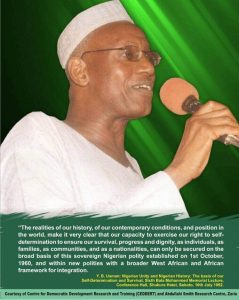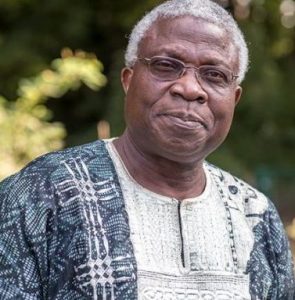
The late Dr Sanusi Abubakar
For a few hours on January 31st, 2018, the controversy in the public sphere would shift from any of killer herdsmen, President Buhari’s political future, 2019 and the likes to the political economy of crisis in Nigeria as ex-colleagues, friends and comrades of Dr Sanusi Abubakar converge to mourn the ‘the rebel for all seasons’. Dr Sanusi who died last year share the distinguishing feature of membership of those that went by the tag of ‘Bala Brought Up’, a reference to a concentration of radical academics at the Ahmadu Bello University, Zaria from the mid 1970s to the early 1990s. That distinguishing feature is their being children of privileges associated with the Northern aristocracy but which they renounced in favour of the Talakawa. Although their intellectual enemies mock their radicalism, saying it is steeped in feudal psychology, they did add a flavour uniquely theirs to the political line of the late Aminu Kano.

The late Dr Yusuf Bala Usman, the leader of the ‘Bala Brought Ups’, aka BBUs
In the case of the late Dr Sanusi, it is doubtful if anyone ever caught him red handed relapsing to his biological connections to the Kano traditional authority. There is also a strong memory of how he sought and joined with intellectuals across the ethno-regional and religious fault lines in Nigeria when he was starting his education newspaper which was committed to sectoral reform. He is equally rated to have been a brilliant, creative and forward looking intellectual, one of the earliest advocates of the use of satellite imagery for mapping agriculture when he was a researcher at the university’s now dead Centre for Social and Economic Research, (CSER).
As thus a key actor in the years of the radical ferment in Zaria, the memorial in his honour could turn a huge reflective session on the power/knowledge dynamics in the explanation of crisis in Nigeria. More than any other university in Nigeria, ABU, Zaria of those days appear to have anticipated today by engaging in a heated debate on “The Responsibilities of Political and Other Sciences in Nigeria”, a debate that surprisingly cropped up in retired Francis Cardinal Arinze’s Lecture marking the 10th Anniversary of Veritas University, Abuja recently. Knowledge is a truth seeking enterprise but is there truth outside of power, whether defined in terms of power through hegemony or in structural terms or institutionally or through force? If knowledge is, in the last instance, a creation of power, then what happened between those debates in Zaria and other Nigerian campuses in those days and the virtual anomie in Nigeria today? Is today’s crisis the unraveling of a now hidden, now open tension between the power configuration in Nigeria and the knowledge production community?
Questions on this might range from why successive Nigerian governments could afford to run down Nigerian scholars when the British Prime Minister or his counterparts across the liberal world would not do so. How would he or she when key state policies are products of intellectual reflections in their ‘best’ universities and think tanks. So, why might the Nigerian State be inherently anti-intellectual in its constitution? And is it because it is so anti-intellectual that it goes before scholars of other countries for ideas, for initiatives and for policy lines, most of which are products of different binoculars?

The inside cover page of the Dec 1980 edition of the bi-annual journal carrying the full version of the debate between Bala Usman and Sam Oyovbaire initially before Prof Adebayo Olukoshi and the late Prof Eme Awa joined
Again at the lecture under reference, Cardinal Arinze made an interesting intervention. As reported under the title “Only Statesmen Can Save Nigeria, Not Politicians – Cardinal Arinze”, (www.intervention.ng/04/12/17), he argued that universities were expected to listen to the expressed needs of the state in terms of what could be done but without losing its identity or allowing itself to transform into intellectual mouthpiece of the state or a political party. He did not see the need for the state to be scared of the thinking power of the university while the university should not degenerate into functioning as if it were an opposition party to the government in power. As the latest of such interventions on this puzzle, his position provide scholars with a starting point for any reflective expedition.
The other side of all this, however, is the 2007 statement by an ASUU top shot that looking again at theses written around the period of the ferment, it would be found that many of them labored under the weight of doctrinal claims that were not substantiated. Could the problem have come from scholars writing as if they were guardians of the radical, anti-imperialist orthodoxy without looking critically enough at evolving local dynamics? What would we then make of the scholar-activists in platforms such as the Socialist Congress of Nigeria, (SCON) who, as early as 1989, predicted exactly what is happening in Nigeria today? Such scholars cannot be associated with being too ideological to the point of forgetting the mandate of academe.

Prof Niyi Osundare
Finally, why did Dr Sanusi and many other academics leave the universities, in his own case, in favour of journalism? Was it fundamentally on account of the gripping narrative of the crisis as rendered by Niyi Osundare in his July 2005 Valedictory Lecture to the University of Ibadan titled “The Universe in the University: A Scholar-Poet’s Look from Inside Out”. Are those who remained in the university system anywhere near being happy or just living in gloom?
Can academics who read Osundare’s account of what has happened to the university system in Nigeria still respond heartily to the expressivist summons “If you are happy and you know, clap your hands”. Is it still practicable to heed the summons on intellectuals to strive to light a candle in whichever little corner they might be? Are there still even little corners that have escaped the rot? How many would say they can even find the match sticks to light any candles in the space visualised in Osundare’s Inaugural lecture? The University of Ibadan is where the rot has been better managed than elsewhere. Even then, can Ibadan sustain another round of its iconic debate: Is Colonialism an Episode or an Epoch? The historians are still there, surely ready to do battle but is there an atmosphere supportive of such anymore?
Former president, Olusegun Obasanjo, is perhaps, right about his characterisation of the existing political parties. Why is it not the case that they are funding debates in Nigerian universities? Who would say that this is not when Nigeria needs taking another look at the University of Ibadan debate on whether colonialism is an episode or epoch? Isn’t there a fundamental problem if no one is making reference to any such debates in the past? What is the political education section of Nigerian political parties doing if not such engagements? There lies the problem! But, where does the way out lie? Perhaps, those coming to Dr Sanusi’s memorial might have new ideas on that.
It promises a great gathering, not minding the heavy presence of royalist elements. Mallam Kabir Yusuf, Chairman of Media Trust Limited who will chair the occasion could have been an emir. Muhammadu Abbas Sanusi 11 who will be the Royal Father of the Day is the Emir of Kano. But this will not make it exclusively a day of royalists. Products of the ABU, Zaria – Bayero University, Kano axis in Abuja would be there. Other activists of various commitments would be there. Academics and even media intellectuals will bring up the rear. In the end, Dr Sanusi would still be making his contributions to the debate on the political economy of crisis. May his soul never rest in peace but up and doing in tormenting the oppressors in the great beyond!




























